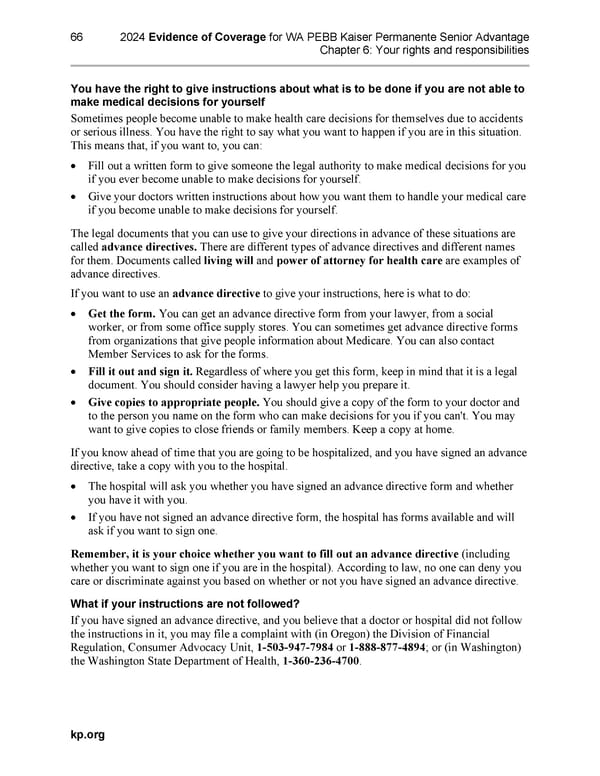66 2024 Evidence of Coverage for WA PEBB Kaiser Permanente Senior Advantage Chapter 6: Your rights and responsibilities You have the right to give instructions about what is to be done if you are not able to make medical decisions for yourself Sometimes people become unable to make health care decisions for themselves due to accidents or serious illness. You have the right to say what you want to happen if you are in this situation. This means that, if you want to, you can: • Fill out a written form to give someone the legal authority to make medical decisions for you if you ever become unable to make decisions for yourself. • Give your doctors written instructions about how you want them to handle your medical care if you become unable to make decisions for yourself. The legal documents that you can use to give your directions in advance of these situations are called advance directives. There are different types of advance directives and different names for them. Documents called living will and power of attorney for health care are examples of advance directives. If you want to use an advance directive to give your instructions, here is what to do: • Get the form. You can get an advance directive form from your lawyer, from a social worker, or from some office supply stores. You can sometimes get advance directive forms from organizations that give people information about Medicare. You can also contact Member Services to ask for the forms. • Fill it out and sign it. Regardless of where you get this form, keep in mind that it is a legal document. You should consider having a lawyer help you prepare it. • Give copies to appropriate people. You should give a copy of the form to your doctor and to the person you name on the form who can make decisions for you if you can't. You may want to give copies to close friends or family members. Keep a copy at home. If you know ahead of time that you are going to be hospitalized, and you have signed an advance directive, take a copy with you to the hospital. • The hospital will ask you whether you have signed an advance directive form and whether you have it with you. • If you have not signed an advance directive form, the hospital has forms available and will ask if you want to sign one. Remember, it is your choice whether you want to fill out an advance directive (including whether you want to sign one if you are in the hospital). According to law, no one can deny you care or discriminate against you based on whether or not you have signed an advance directive. What if your instructions are not followed? If you have signed an advance directive, and you believe that a doctor or hospital did not follow the instructions in it, you may file a complaint with (in Oregon) the Division of Financial Regulation, Consumer Advocacy Unit, 1-503-947-7984 or 1-888-877-4894; or (in Washington) the Washington State Department of Health, 1-360-236-4700. kp.org
 Kaiser Permanente NW Senior Advantage EOC (2024) Page 103 Page 105
Kaiser Permanente NW Senior Advantage EOC (2024) Page 103 Page 105